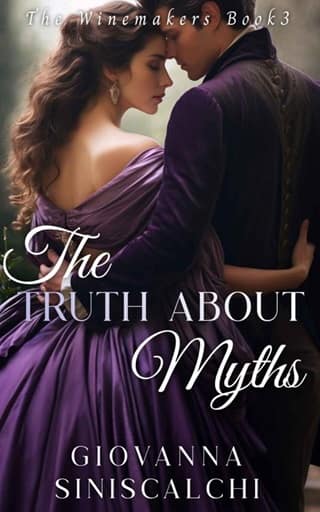8. Chapter 8
Chapter 8
"It is not difficult to govern. All one has to do is not wish to appear wiser than the laws, nor richer than the country, nor more noble than the citizen." Queen Maria II of Portugal"My Lady, your entourage awaits."
Henrique’s grave voice startled Isabel, and she gripped the railings. What would she see in his eyes this morning? The tender understanding they shared in the garden? Or mockery? She cared not for how they treated each other before last night’s incident. The veiled insults, the need to keep her guard up, the fluttery feeling inside her chest every time he came near. It would be exhausting to spend the summer in opposing trenchers.
They had different points of view, it was true. But two parties could coexist without constant altercations. She had selected a medal from her jewelry box—the Viana’s heart—as a peace offering. Ready for a unilateral compromise, she clutched the small parcel.
Now, facing him in the crowded hotel lobby, her grand idea, the perfect way to appreciate his bravery and seal their newfound friendship, made her cheeks burn and her neck prickle.
She met his eyes, searching for something… What? He was back in the skin of an aristocrat-about-town—well shaved, hair combed, his light grey morning coat matching his striped trousers. When she found no traces of the disheveled hero who had saved her last night, Isabel stuffed the velvet pouch in her jacket’s pocket.
He had renewed his invitation for her to ride with him. Perhaps the right moment to give him the medal would present itself later. "Will you show me this mare you’ve been bragging about?"
"I’m waiting for your pleasure." He gazed at her expectantly, as if he too wondered where they stood, and offered his arm.
He escorted her to the hotel courtyard. Word had come out of her true identity, and people leaned over their windows and porches, watching the liveried servants and the lacquered carriages lining the street. The cheers and smiles on her subjects’ faces warmed her heart. Isabel waved graciously while Henrique waited patiently. It took fifteen minutes for them to cross to the two saddled horses waiting behind her coach.
"Is it always like this?" He glanced beyond his shoulder, where the crowd still cheered.
"Not always. But, yes, whenever I’m recognized."
"Doesn’t it bother you?"
"I’m a princess. Women look up to me as an example of moral conduct. It is my duty to inspire." She took pride in being an asset to the Royal Family.
"And you shape your life around this duty?" He studied her, his head tilted to the side.
For the first time, she felt in the presence of a scientist, not a rake. It gave her a fuzzy feeling in her stomach, not at all unpleasant. That’s what his experiments must feel like—not judged but analyzed.
She forced herself to respond truthfully. "It is my obligation, and serving my country makes me happy."
His lip lifted, flashing a dimple. "Aren’t you a patriotic princess?"
"At least of this crime, I cannot plead innocence. I’ve traveled the world, but this… this is home. Don’t you love our land?"
"They have rugged cliffs in other places, too." He looked away, and the dimple vanished.
Other places? None of them as majestic, for sure. Isabel was about to admonish his lack of love for Portugal but swallowed her words. His neck and shoulders were stiff. She wouldn’t start another conflict.
A neigh from the waiting steeds pulled him out of his musings.
He exhaled and steered her toward the horses. "This is Dulcinea."
Isabel chuckled. "Don Quixote’s dream lady? So this makes your horse the intrepid Rocinante?"
Henrique patted the stallion’s chestnut coat, a grin crinkling the corners of his eyes. "You wound this steed with such dastardly a name. Can’t you see he would put the knight-errant’s nag to shame? This, my lovely princess, is Incitatus."
Isabel feigned shock. "Caligula’s horse? Careful, sir, beasts show their owner’s true character."
"Caligula so loved his horse, he made him a senator of Rome." He lifted his brows. "Madness runs deeply in royalty."
"That’s hardly fair. As a scientist, you should know it was never proven madness is more frequent among royal families than common folk."
He studied her, his eyes glinting. "Has anyone ever said you have a fetching logical mind?"
She was rarely admired for her intellect and batted her eyelashes playfully to conceal her reaction. "Cease, sir. You will make me vain with your flirtation."
"When common people go mad, they are locked in sanatoriums. When royalty goes soft in the head, they run rampant, impaling their enemies, planning a winter invasion of Russia, or living to please others. Now, enough dawdling. We better move if we are to reach Tavora before nightfall." He bent, linking his fingers, and gave her a suggestive look.
Did he expect to help her mount? Climbing a sidesaddle was no easy feat. The lady depended on her helper for the right amount of push—too much, and she would topple over the horse, ending up flattened on the other side. Too little, and she wouldn’t make it. Where was her groom?
"Come on. I won’t throw you off."
"Sir, you seemed ready to do worse yesterday." To her shame, she couldn’t conceal the hurt in her voice.
"I was an ass, wasn’t I? Can we start anew?" He looked at her openly, no jests.
Despite the crass word, she felt the sincerity of the apology and placed her right foot over his palms. Before she could spring, he lifted her effortlessly.
Her chest became level with his face, his breath warming the velvet of her gown. The invisible threads came alive, connecting them as if they were tied with hemp rope. Her heart leaped to a double measure, and her stomach stirred.
His smile faded, and his eyes focused on her lips. "Isa…"
"Hmm?" She had the baffling impulse to trace his cheek and feel the grains of his shaved skin.
"After last night, I—Are you all right?"
Cheeks flushed, Isabel adjusted herself over the saddle and made a show of concealing her legs below the folds of her woolen skirts.
He pulled her chin up.
Her heart bruised her ribcage, and she sensed he expected something from her, and it maddened her that she didn’t know what. The little medal burned inside her jacket. Should she give it to him now? Just so she could occupy her hands?
"I’ll be fine, thank you."
He kept eye contact. By daylight, his irises weren’t a maze but two fathomless lakes. She was glad she had never learned to swim. Otherwise, she would be tempted to dive.
Around them, horses snorted, jingling their bridles. Wheels scrunched gravel, and birds chirped.
"Should we go?"
He pulled away from her, walking backward until he reached his horse. As Henrique mounted his steed and signaled the guards to proceed, she admired the ease with which he carried himself and the husky timbre of his voice. Last night had vanquished the animosity between them, but it had done nothing to control the fluttering inside her stomach.
Távoras’s inhabitants had decorated their village square with lavender and hydrangeas. Still, little effort was needed to make their city inviting. Whitewashed buildings lined the narrow streets, and bougainvillea adorned the simple but charming cottages.
Isabel’s cheeks hurt from the smile she kept on her face, her right shoulder sore from waving at villagers and accepting gifts. None of that bothered her. It was the least she could do after learning about the ravages of phylloxera. The wine plague had curtailed their livelihood. She would write about their plights to Luis. Even with the rightful complaints, an aura of cheerfulness prevailed. She had been correct to arrive as the princess and not mask her identity. People needed to see the royal family. It gave them hope and made them feel special.
Henrique stood at the fringes of the small group. He had been silent during the trip, and his introspection increased with each flower given to her or the children she embraced.
"Can we retire now? The sun is burning my nose," Dolly whined, pressing Isabel’s arm.
Isabel nodded and said her farewells. When the royal entourage returned to the carriages, Henrique took the opposite direction, his gray coat vanishing into a side street.
Isabel told Diomedes to proceed with Dolly to the hotel. Escorted by Sophie and a guard, she followed Henrique. The walled city was tiny, and she had no difficulty trailing his steps to an ancient house.
A plaque read Cister Monastery. Isabel asked her maid and guard to wait outside and, ignoring their protests, crossed the copper gate. Stillness pervaded the moss-covered stone walls, the kind present only where no one had lived for generations. The main entrance opened up to an inner courtyard. Isabel shuddered at the sight of a greenish pond, half expecting to see a drake landing in its depths. Should she return? But Henrique had not been himself. What if he fell ill?
Rubbing her arms against the sudden chill, she followed the path until she arrived at a stair leading down. Curiosity piqued, she descended the stone steps, holding the granite wall for support. The passageway opened to a cavernous space with an arched ceiling. Water dripped. The scent of wood and mold mingled with wine. A cellar. Blinking to adjust her eyesight, she crossed the threshold.
A gigantic log occupied the center of the room. Dust-covered bottles protruded from the contraption like the needles of a porcupine.
Henrique had his back to her, studying the apparatus.
Her breath caught, and she paused. The inconvenient flutter started anew.
When a minute passed, and Henrique didn’t move, she gripped her elbows, her eyes straying to the exit. Why had she followed him here? He must have wished for a private moment. She picked up her skirt to leave.
"Do you know what these are for?"
He stood several feet from her, but the vaulted ceiling echoed his voice as if he had spoken near her ear.
"To store wine?"
He chuckled, closing his eyes. "No."
"I shouldn’t intrude. I just wanted to—"
"The Cister Order arrived in Portugal in the twelfth century. They brought their methods of winemaking from France." Holding a bottle with his bare hand, he turned it on its axis like a faucet. He then moved to the next in line and repeated the same gesture. Slowly, reverently, he played glass against wood, evoking a mournful chime.
"Are you familiar with winemaking science?"
Isabel shook her head and stepped closer.
"After the grapes are macerated, wild yeasts on the skins attack the juice, turning the sugar into alcohol." Like when he spoke about cicadas, his voice became lower and graver. It held a hint of wonder, of deep curiosity that made her want to partake in his science as if it were delicious food or a ticket to an exotic place. "Because of Távora’s colder temperature, the yeasts don’t complete the fermentation in the pipes. They go to sleep. When they wake up in summer, the process starts again, this time inside the bottles, trapping the carbonic gas. The result? Bubbles."
"Champagne?"
His smile didn’t reach his eyes. "Sparkling wine. But the gas comes with an unwanted byproduct. Do you see? This mossy powder inside the glass? It’s the dead yeast. The monks built these racks to turn the bottles a few degrees every month, sweeping the powder closer and closer to the bottle’s finish. This way, when the dust reaches the cork, they can extract the yeast with minimum loss of bubbles."
Awed, she touched the rack, and the raspy wood caught on her glove. "I didn’t know Portugal produced such wine. Why is this place deserted then?"
"After the liberal revolution, the monks were expelled. I’m not a religious man, but did we have to forget the process along with the tonsured folk? And now, fifty years later, France sells champagne for fifteen Reis a bottle. Portugal peddles a full casket of red wine for five."
"I will write to my brother. Certainly, he can do something—"
"Why not? Let our King Luis resolve everything." His voice changed, becoming cool and detached.
The loss of wonder disturbed the air, making it thick and uncomfortable.
Isabel felt inside her skirt pocket until she clutched the gift. Her cheeks grew warm, and she extended her arm before courage deserted her. "I’ve brought you this."
Frowning, he opened the package and stared at the gold piece atop his palm.
"It’s a filigree heart. The symbol of Portugal. For what you did yesterday. A token of friendship." She delivered the words in short bursts.
His virile hand closed around the medal, engulfing it. He averted his eyes, his attention back on the bottles. "I’m sorry. I’m dreadful company for princesses today."
She took a step closer. "Does it have to do with the vineyards?"
He exhaled loudly. "The cure for phylloxera was found last year, but winemakers are still trying the most outlandish methods to get rid of this plague." He jerked the bottles.
"Do you know how many types of grapes are only raised here, in this country that fits six times inside France? Over two-hundred-fifty. Much more than the forty that exist in Bourdeaux and Burgundy. Do you know what will happen? No Portuguese native vine will survive." The bottles shrieked in the rack as he turned them violently.
Isabel covered her ears.
"After the grapevines are destroyed, we will have to import them from France. Stupid villagers."
Isabel flinched. How could he speak as if the problem didn’t concern him? "You are the wine expert. Why don’t you do something?"
He halted. The last screech echoed on the stone walls and vanished, leaving in its place a pointed silence.
"I won’t be here."
"I don’t understand."
"After this little trip of yours, I will leave Portugal."
"But when will you return?"
"Emigration, have you heard of it? It is permanent."
Isabel crossed her arms above her chest and took a step backward. How unfair to criticize the peasants when he couldn’t wait to turn tail and flee. She grabbed her skirt and strode to the passageway.
"Isa?" His voice came from too close behind her.
Isabel halted.
"You should keep the medal." He pulled her hair above her left shoulder, brushed the naked skin above her collar, and pinned it to the lapel of her jacket.
The gesture, too intimate, lifted the hairs on her arms, and her eyelids fluttered shut. His presence hummed against her spine, insistent, impossible to be ignored.
She turned to face him. His eyes lulled her, the blue of Portugal’s sky reflecting on the ocean. Isabel pulled in a shaky breath and held the air inside her lungs like a swimmer who realized the water was too deep. Except she had never learned how to swim.
"There." He took a step away from her. "You will care better for Portugal’s treasure."
Isabel covered the jewel with her palm. His voice had the same note of despair she’d heard last night when he blamed himself for not arriving in time to protect her.
She placed a hand over his forearm. "You can do so much for Portugal. If only—"
"Do you believe men and women can be friends?"
The sudden change of subject startled her, and she smiled nervously. "Why, yes? If a rider can befriend his horse, and a lady can befriend her maid, surely—"
"The rider wants to ride the horse, and the horse wants to be fed. The lady wants her hair dressed, and the maid wants to get paid." He gave her the sardonic smile she despised. "Are you seeing a pattern yet, Isabel?"
 Fullepub
Fullepub 



